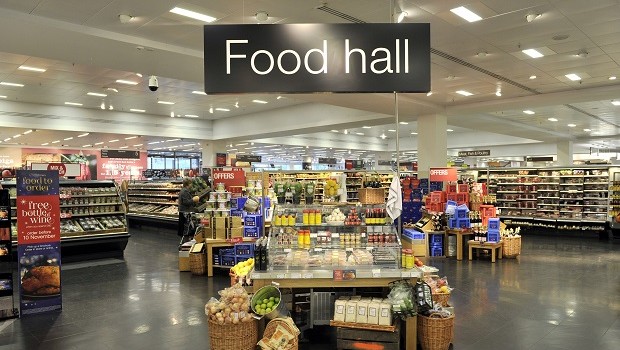M&S shares surge as FY beats forecasts, sees 'modest' dividend

UK retailer Marks & Spencer delivered a forecast-busting annual profit driven by a major improvement in its food division and said it would reinstate a “modest” dividend in November.
FTSE 250
20,591.40
17:00 03/01/25
FTSE 350
4,534.15
16:54 03/01/25
FTSE All-Share
4,490.88
17:14 03/01/25
General Retailers
4,673.36
16:54 03/01/25
Marks & Spencer Group
390.50p
16:35 03/01/25
Adjusted pre-tax profit came in at £482m, down from £522m last year, but better than expectations of £431m as labour and staff costs along with an exit from Russia after the start of the Ukraine war. The prior year’s figure was also boosted by almost £60m in business rate relief. Revenues rose 9.6% to £12bn.
“While the economic outlook for consumer spending is uncertain, cost inflation remains high, and market conditions are expected to become more challenging, the strategy is beginning to deliver improved performance and there remains much within the group's control,” the company said on Wednesday.
“In full-year 2024, modest growth is expected in revenues, driven by omni-channel as well as from the benefits of the accelerating store rotation plan. Further investment in quality and trusted value will be partly offset by actions to mitigate sourcing cost pressures and to reduce waste and stock loss.”
The group said cost headwinds in 2023/24 included more than £150m in extra energy and staff costs. It expects to offset these with targeted savings of the same amount.
M&S has not paid a dividend since its 2019/20 year as part of a move to protect its balance sheet during the Covid pandemic and would restart payments in November.
STRIDING AHEAD IN CHINOS
Clothing and homewares surged 11.5% to £3.72bn, with a 25% rise in chino trouser sales, while food revenues rose 8.7% to £7.22bn.
However, the retail online grocery joint venture with Ocado fell £59m into the red, with M&S recording a £29.5m loss nfrom its share in the business, down from a profit of £13.9m a year before, as total sales fell by 1.2% to £2.22bn.
AJ Bell investment director Russ Mould said a push "athleisure" clothing had helped to bring in a younger crowd, "while a greater focus on mainstream items such as casual dresses and denim have made the company more appealing to the general shopper".
“A 25% jump in chino sales might be driven by more people going back to work in the office but not needing to wear a suit, but in reality it’s more to do with them coming back into fashion. No longer confined to dads trying to look cool by pairing them with a polo shirt (tucked in, of course) and their running shoes, they’re now more socially accepted among broader age ranges," he said.
“It’s not all good news, however. The online joint venture with Ocado is undergoing a ‘reset’ as growth hasn’t matched expectations. It is trying new things, but the jury is out on how fast it can achieve success. The Sparks card remains one of the more confusing membership/loyalty schemes on the market and there is certainly more it can do to strike a better chord with customers.”
Reporting by Frank Prenesti for Sharecast.com